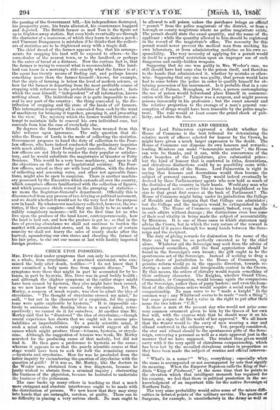CHECK 'UPON POISONING.
hies. DOVE died under symptoms that can only be accounted for, as a whole, from strychnine. A practised anatomist, who exa- mined the body after death, testifies—" I do not know that I ever examined a body more free from organic disease." The symptoms were those that might in part be accounted for by te- tanus, in part by hysteria. Mrs. Dove was in good bodily health ; and although the slighter symptoms at the earlier stages might have been caused by hysteria, they also might have been caused, as we now know they were caused, by strychnine. Yet Mr. Morley, a surgeon of much repute, was slow to admit the idea of strychnine. "The thought of strychnine crossed my, mind," he said, "but not in the character of a suspicion, for the symp- toms were quite explicable by hysteria." It is impossible en- tirely to anatomize the floating ideas in a man's mind, retro- spectively; we cannot do it for ourselves. At another time Mr. Morley said that he " dismissed " the idea of strychnine,—though recent experience has shown that we ought not to assume pro- babilities or improbabilities. To a purely scientific mind, if such a mind exists, certain symptoms would. suggest all the causes which might produce them—tetanus, hysteria, or strych- nine. Although the suggestion of tetanus was weak, Mr. Morley searched for the producing cause of that malady, but did not find it. He then gave a preference to hysteria as the cause ; whereas it appears to us that the purely scientific course at that stage would have been to seek for both the remaining causes —hysteria and strychnine. How far was he precluded from the latter inquiry by encumbering the question of strychnine with the question of guilt? If it was so, Mr. Morley; „,like the doctors in the Wooler case, abstained from a free d. cereals, because he justly wished to abstain from a criminal inquiry ; obstructing the business of the physician, because he hesitated to undertake the business of the policeman.
The case backs up many others in teaching us that a much more stringent and absolute interference ought to be made with the distribution of poisons. We now know that they may stray into hands that are untaught, careless, or guilty There can be no difficulty in placing a very serious cheek. No man ought to
be allowed to sell poison unless the purchaser brings an official " permit " from the police magistrate of the district, or from a borough or county magistrate Where no police magistrate exists. The permit should state the exact quantity, and the name of the apphcant ; while the quantity allowed to him should be registered in the record of the magistrate's office. The necessity for this permit would never prevent the medical man from stocking his own laboratory, or from administering medicine on his own re- sponsibility. The very necessity of applying for a permit would in itself be a powerful restriction upon an improper use of such dangerous and easily-hidden weapons.
Supposing that no one was guilty in Mrs. Wooler's case, we still should have had some clue to the poison itself, and therefore to the hands that administered it, whether by mistake or other- wise. Supposing that any one was guilty, that person would have had to come before the police in order to qualify himself for ob- taining possession of his instrument. Is it probable that in a ease like that of Palmer, Monaghan, or Dove, a person contemplating the use of poison would beforehand place himself in communi- cation with the police ? Palmer was a surgeon, and might possess poisons innocently in his profession ; but the exact amount and the relative proportion to the average of a man's general con- sumption of drugs would have been traceable by the police magis- trate. The rule would at least secure the grand check of pub- licity, and before the fact.


























 Previous page
Previous page